Tensions between the United States and Iran has escalated as Washington dispatched an aircraft carrier strike group and four nuclear capable bombers to the Middle East.
Besides its last year’s withdrawal from the Iran nuclear deal and maintaining sanctions on Iran, the Trump administration added Iran’s Islamic Revolutionary Guard Corps to its list of foreign terrorist organization. Recently, Washington has sent an aircraft carrier, which is said to have at least 40 to 50 planes on it and 6,000 forces gathered within it, to the Middle East that has hit rock bottom between Tehran and Washington.
A miscalculation by military forces in the Gulf was a “very real risk right now” Robert Gates, former US defense secretary, is cited as saying. He added that a conflict between Tehran and Washington would have “tremendous unforeseen consequences in the Middle East” that would be “very, very dangerous”.
Exchanges of harsh rhetoric between US and Iranian officials loom large. US Secretary of State Mike Pompeo said the military deployments came in response to intelligence about potential Iranian attacks and aimed both to deter them and to be able to respond if necessary. On the other hand, Iran’s head of the Revolutionary Guard’s air force Amir Ali Hajizadeh said that “if [the Americans] make a move, we will hit them in the head”.
Sen. Angus King, a Maine independent who recently visited US troops in Iraq, said in his interview with Foreign Policy Newspaper that John Bolton’s fiery rhetoric – as he described the move to send a “clear and unmistakable” message to Tehran – risked provoking Iran into an attack. He was concerned about increasing tensions in the aftermath of Trump administration’s aforementioned movements against Iran and described Washington’s withdrawal from Iran’s nuclear deal “a huge mistake of policy”. Calling the situation “very dangerous”, King said, “We may be moving toward a military confrontation that would be very harmful”. He suggested having “some lines of communication” to avoid confrontation. Quoting Bolton’s 2017 statements that “the only solution is regime change” and “in 2019 we are going to be celebrating in the streets of Tehran”, King described his style as “confrontation”.
It is believed that if Washington’s provocative move sparks off a conflagration between the US and Iran, the stability of the whole region will be at stake. In other words, Israel – which is likely to be the first target of Iran – Saudi Arabia, Iraq, Gaza, etc. will be dragged into the conflict. Heavy human casualties and massive destruction and exodus will ensue. The neighboring countries will not be immune to the consequences, either.
Conflict between Iran and the US will have no winner at all. It should be noted that there are a large number of religious ideologists, including men and women, across Iran who will fight to the last drop of their blood. In other words, apart from its military forces, Iran has at least 20 million selfless individuals, who are ready for “altruistic suicide”, to borrow the words of French sociologist Emile Durkheim. Since Iran is a religious community and more than 99 percent of them believe that Mujtahids’ fatwa, a religious decree by Muftis, are an obligation in Islam, almost each individual will participate in the fight against the US forces if Iranian clerics and Mujtahids issue fatwa for jihad. There is no doubt that all Iranian Mujtahids and Muftis will issue such a fatwa.
Most probably, a number of Muslim migrants as well as Iraqi Shiites will also participate in the fight against the US.
It will be a big miscalculation if US officials believe that Iranians are seeking “regime change” similar to those in Arabic countries. Counting on very few individuals, who hurl vitriolic attack against Iran mainly from outside, will be a terrible mistake. Iranians are still chanting “death to America” in their demonstrations and Friday prayers.
Trump’s anti-Iran movement seems unnecessary and very fast. In a commentary titled “The Global War on Terrorism Has Failed. Here’s How to Win.”, Brahma Chellaney, professor of strategic studies at the Center for Policy Research in New Delhi, said, “The United States lists Iran, Sudan, Syria, and North Korea as state sponsors of terrorism but not Saudi Arabia, despite Trump calling the country ‘the world’s biggest funder of terrorism”’. Accepting Iran as “a destabilizing regional force”, the author denied Trump’s claim that Iran was “the world’s leading state sponsor of terrorism” as he argued that Sri Lanka bombings, the September 11 attacks, the 2008 Mumbai siege, and other largest acts of international terrorism “were carried out by brutal Sunni organizations with connections to Saudi-sponsored Wahhabism but none to Iran” and described “Wahhabism” an ideological source to all major terrorist organizations. With this in mind, Trump administration should not adopt a selective approach towards countries.
Both Iran and the US are recommended to respect and support regional and global stability and resolve their issues through negotiation rather than confrontation.
Home » Opinion » Iran-US Tensions Highly Critical
Iran-US Tensions Highly Critical
| Hujjatullah Zia

